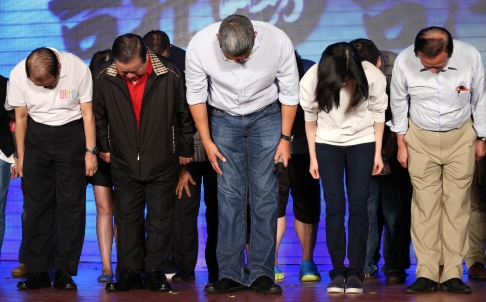
Taiwan’s “Vote of No Confidence” For KMT (and China Too)
Publication: China Brief Volume: 14 Issue: 23
By:

Taiwan’s largest election ever, on November 29, led to a rousing, if not expected, defeat of Taiwan’s governing and pro-status quo party, the Kuomintang (KMT), by the pro-independence Democratic Progressive Party (DPP), dealing a crushing blow to Taiwanese President Ma Ying-jeou’s administration. Moreover, the election was widely seen as a rejection of the KMT’s pro-China policies, especially in the wake of this spring’s Sunflower Movement in Taiwan and the ongoing Occupy Central Movement in Hong Kong. The DPP landslide raises the prospects of a DPP victory in Taiwan’s upcoming 2016 presidential election, suggesting a new challenge to cross-strait relations.
An “Unprecedented and Crushing Defeat”
With 22 counties and municipalities, as well as more than 11,000 lower-level positions, up for grabs, KMT candidates lost 16 of the 22—including to an independent in the all-important Taipei mayoral race. The KMT’s “unprecedented and crushing defeat” was at least somewhat predictable, as President Ma’s approval rating had dipped as low as 9.2 percent last September and now hovers around 20 percent (People’s Daily Overseas, December 2; Taipei Times, September 16, 2013). The election also followed the Sunflower Movement, the youth-led protest this March and April against the KMT’s rushed passage of the Cross-Strait Services Trade Agreement (CSSTA), and the Hong Kong protests, which influenced at least some Taiwanese voters to become further disillusioned by Chinese President Xi Jinping’s repeated offer of “one country, two systems” (see China Brief, April 9; China Brief, October 23; Taipei Times, September 26). Ma’s entire cabinet resigned from their government positions and nearly all of the senior KMT leaders resigned from their party posts in the wake of the election, including Ma as chairman of the party.
The DPP victory came despite efforts to boost the KMT’s showing at the polls, with Beijing offering subsidized airfares to Taiwanese living in China, who generally support the KMT. Furthermore, Beijing’s decision to hold high-level meetings with Taiwanese officials over the last year afforded Taiwan more legitimacy than ever before, though unsurprisingly not enough in the eyes of Taiwan. Zhang Zhijun, the director of China’s Taiwan Affairs Office, met with his Taiwanese counterpart, Wang Yu-chi, three times this year, including most recently at the Asia-Pacific Economic Cooperation (APEC) summit in November. During their first meeting in Nanjing this February, the highest-level meeting between the two sides since the KMT lost the Chinese civil war, Zhang referred to Wang using his official title of “minister,” signaling a symbolic nod to Wang’s position and thus Taiwan. Yet Beijing appears to have hedged the possibility of a DPP victory in 2014 and 2016, as Zhang visited the DPP-stronghold of Kaohsiung during his June trip to Taiwan, meeting Mayor Chen Chu (South China Morning Post, June 25).
The KMT’s defeat may lead Beijing to reevaluate the ratio of its “carrot and stick” approach to Taiwan. Although the most effective policy would likely be to enhance high-level political engagement and further economic generosity through more cross-strait agreements while President Ma is still in office, Beijing is more likely to favor reducing official cross-strait meetings and further constricting Taiwan’s international space if Ma slows engagement, which he may do after his comments following the election: “I have heard their voices and I will not evade my responsibility to start reforms” (South China Moring Post, November 29). The DPP is also in the process of gauging their future China policy, as it froze discussions on foreign policy in the run-up to the election, and the DPP understands that its victory was more a vote against the KMT than a show of support for the DPP’s China policy. Ultimately, however, a return to military tension is unlikely as long as President Xi feels confident China holds the cards.
Blame the KMT, Not the CCP
The Chinese government ignored any connection to the KMT’s pro-China policies and had a rather muted response, with limited discussion in state-run media and orders for censors to “not hype Taiwan’s ‘nine-in-one’ election, […] contain [online] commentary [and] uniformly delete all content attacking the political system of the mainland” (China Digital Times, November 30). One People’s Daily Overseas article, entitled “Nine-In-One, the KMT Lost to Themselves,” said “the election was a strong vote of no confidence against the Ma administration” (People’s Daily Online, December 1). Several articles cited the rise in gasoline and electricity prices, wage stagnation and food scandals, while another mentioned Ma’s inept management of the KMT and the party’s inability to pass major laws easily despite holding majority in the legislature, as the main reasons for the DPP’s victory. State-run media also explained the defeat as tied to KMT’s failure to recognize and adapt to the changing nature of the Taiwanese electorate—more centrist voters and politically-involved young adults. Yet the Chinese media did not label Ma a “lame duck president,” as it did when U.S. President Barack Obama suffered a similar defeat in the November U.S. midterm elections (see China Brief, November 7).
There was no introspective criticism of China’s role in the KMT’s defeat, in stark contrast to the People’s Daily’s jubilant coverage of President Ma’s 2012 reelection that proudly touted the source of his victory as improved cross-strait relations under his pro-China policies (People’s Daily, January 15, 2012). In fact, there was no significant discussion of the election’s consequences for cross-strait relations until People’s Daily Overseas ran an article four days later. Breaking with lighter coverage over the first few days, the article said that the elections were “local” and thus “had little connection to cross-strait relations” (People’s Daily Overseas, December 3).
Beijing Warns DPP to be Pragmatic
The December 3 article made a clear statement of Beijing’s policy: “The DPP faces two roads: one is to continue to maintain its ‘independence’ stance and reject the ‘[19]92 Consensus,’ stop the Cross-Strait Services Trade Agreement, damage the Taiwanese peoples’ happiness and suffocate Taiwan’s economic development; or the second is to cast away its fantasy, respond to the will of the people for peace and development, and pragmatically adjust its cross-strait policy.” And just to reinforce Beijing’s upper hand, the article quoted a Chinese analyst as saying, “with the mainland’s strengthening comprehensive power and expanding international influence, the mainland already fully controls the leadership role in cross-straight relations, so any governing authority in Taiwan will find it difficult to resist the historical trend of peace and development for cross-strait relations.” The official Chinese government statement from the Taiwan Affairs Office was, “We hope compatriots across the Strait will cherish hard-won fruits of cross-strait relations, and jointly safeguard and continue to push forward peaceful development of cross-strait relations” (Xinhua, November 29). Clearly, a DPP-led Taiwan in 2016 is already on Beijing’s mind, and memories of the DPP’s only previous president, Chen Shuibian, worry the Chinese government.
Preview to 2016 and Beyond?
Discussing the implications for Taiwan’s upcoming presidential election, the People’s Daily Overseas said 2016 will ultimately be decided by which party can “catch up with the will of the people” and “who will be the best in the voters’ eyes” (People’s Daily Overseas, December 1). Likely projecting undue pessimism, the article questioned Tsai Ing-wen’s leadership of the DPP as weak and unable to unify the party, adding that Tainan Mayor Lai Ching-te may challenge Tsai for the presidential nomination. In contrast, another article said the KMT’s “future is very pessimistic” and that the DPP’s growing control over local positions would have “serious consequences” for the next presidential election (People’s Daily Overseas, December 2).
With the DPP’s surge in momentum comes responsibility to calibrate its cross-strait policies not only for Taiwanese voters, but also Taiwan’s security. Former DPP leader Chen Shuibian’s presidency was marked by cross-strait tensions over his pro-independence stance, and the DPP has not officially abandoned that position. While the DPP appears to be moving to a more pragmatic, if ambiguous, policy under Tsai, Taiwan’s next president will have to decide how much maneuvering is necessary to satisfy voters—and how much Beijing will tolerate.





